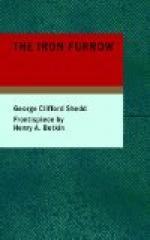“I’m glad,” she said, “I’m glad, John.”
“Yes, I decided it was a good trade to make,” her husband assured her. “No need to think it over longer.”
They came to where Bryant stood, unconcealed pleasure showing on Mrs. Stevenson’s face.
“You may like to see these kodak pictures of the farm and its house,” the young man said, producing an envelope from a pocket. “Take a chair here by the window, Mrs. Stevenson, where you’ll have the light. See, this one shows the house, with the trees and lilac bushes in front, and gives you a glimpse of the flower garden. Pretty, don’t you think?”
She readjusted her spectacles. After a time she gazed from the pictures through the window at the stretch of sagebrush.
“And I’ll have neighbours, too,” she said, in an unsteady voice. “The loneliness here was killing me.”
Stevenson considered the backs of his hands in awkward silence.
“Neighbours, lots of them,” Bryant affirmed.
“I kind of pity you having to stay,” she said, looking up at him with a smile.
The engineer laughed.
“Why, this country suits me right down to the ground,” he replied. “I’ve been in the West ten years, wouldn’t live anywhere else. And I don’t expect to be lonely; Menocal will probably attend to that. Besides, there are two good-looking young ladies just south of here, on Sarita Creek.”
“That’s so,” she said, laughing also.
“First thing we hear, you’ll be married,” Stevenson remarked, with a quick grin.
“Oh, I’m safe—there are two of them,” Bryant returned, clapping the rancher on the shoulder.
CHAPTER III
The town of Bartolo slumbered in the July sunshine. Nothing stirred on its one long street, lined with scarcely a break on either side by mud-plastered houses that made a continuous brown wall, marked at intervals by a door or pierced by a window; nothing stirred, neither in front of Menocal’s large frame store at the upper end of it, with the little bank adjoining, nor before the small courthouse grounds across the way, where the huge old cottonwoods spread their shade, nor along the entire length of the beaten street down to Gomez’s blacksmith shop and Martinez’s saloon across from each other at the lower end; nothing, not even the pair of burros drowsing in the shade of the wall, or the dogs lying before doors, or the goats a-kneel by the saloon, or the fowls nested down in the dust. Only the Pinas River, issuing from the black canon a mile or so above, was in motion; and, indeed, it appeared to partake of the general somnolence, barely rippling along its gravelly bed, shallow and shrunken, and giving forth but an indolent glitter as it flowed past the town. The day was hot and it was the hour of the siesta, therefore everything slept—everything, man, beast and fowl, from Menocal, who was snoring in his hammock on the vine-clad veranda of his big stuccoed house just beyond the store at the head of the street, to the goats at the foot of it by the silent saloon.




